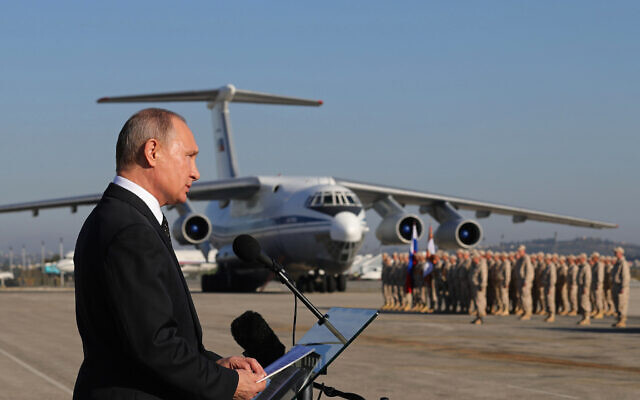Israeli jets carried out airstrikes on targets near the Syrian capital Damascus early Monday, Syrian State TV reported.
The alleged attacks are the first since Russia announced last week that it was carrying out joint military jet patrols in airspace along Syria’s borders, including the Golan Heights region.
TV reports said Syria had activated its air defenses and intercepted several incoming missiles, but noted that some “material damage” was caused by the attacks. There were no immediate reports of casualties.
Syria regularly claims to have shot down Israeli missiles. Syrian war analysts generally believe that such claims – heard after nearly every Israeli air strike – are false, hollow claims.
The report said that the missiles were fired from the neighboring country of Lebanon. The targets of the attacks were not immediately clear.
Israel has carried out hundreds of attacks on targets inside government-controlled Syria over the years, but rarely acknowledges or discusses such operations. Several attacks in the past have targeted the main airport in the capital Damascus, through which Iran is also believed to transfer advanced weapons to its proxies.
Israel, however, has acknowledged that it targets targets of Iranian forces and Iran-affiliated terrorist groups, particularly along the Golan border, such as Lebanon’s Hezbollah, whose fighters are stationed in southern Syria. It says it also attacks weapons shipments that are believed to be bound to the groups.
Hezbollah is fighting on behalf of Syrian President Bashar Assad’s forces in a decade-old civil war.
In December, Israel reportedly carried out two high-profile attacks on the Syrian port of Latakia.

Flames emanated from containers at the site of a missile attack, in this photo released by the Syrian official news agency SANA, at the port of the coastal city of Latakia, Syria, early Tuesday, December 28, 2021. (Sana via AP)
Although Israel conducts regular raids against Iranian-linked targets in Syria, it rarely strikes close to Latakia, let alone inside the terminal, as Russian forces maintain a base of operations nearby. Due to its delicate relationship with Moscow, Israel generally refrains from launching attacks against targets if there are Russian troops nearby, although Israel believes this well-known policy led to the transfer of its weapons to Iran. The defense is led to hold near Russian-controlled. Area.
Last week Russia conducted a joint air patrol with the Syrian Air Force on the border with Israel, prompting speculation that Israel would be more hesitant to attack Syria.
After the patrol, Ynet reported that Israeli military officers were in talks with Russian military officers to defuse tensions.
According to Ynet News, Israeli officials are struggling to understand why Russia has apparently changed its policy towards Israel, as such joint patrols are expected to proceed regularly after the announcement. Was.
The report claimed, without citing any sources, that even after discussions are over, Russia’s move could result in Israel limiting its air operations in Syria.

Russian President Vladimir Putin addresses soldiers at Hemimem airport in Syria on December 12, 2017. (Mikhail Klimentyev/Pool Photo via AP, FILE)
In an effort to avoid an accidental confrontation when the IDF conducts attacks on sites within Syria, Israel has maintained close military coordination with Russia in Syria.
Russia became involved in Syria’s civil war in September 2015, when the Syrian army appeared to be near collapse, and has since helped to tilt the balance of power in favor of Assad, whose forces now control much of the country. Hundreds of Russian troops are stationed throughout Syria and they also have a military air base on Syria’s Mediterranean coast.